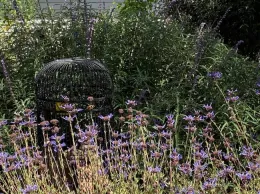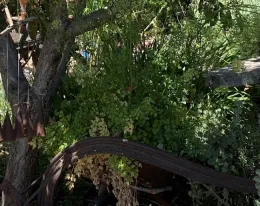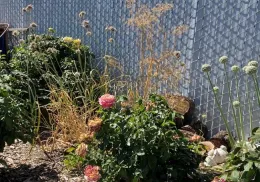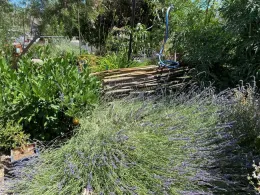My wife and I have been together since late 1979. Over these many years, we have come to enjoy every venue of gardening – and take advantage of all the space we have had in each of the sites we called home. It hasn't always been easy, but we have always been up to the challenges. Early on, we found common grounds in which to bond – our love to garden and to prepare and enhance foods! Often our daughter would come into the kitchen as food was being prepared and invariably make the statement “Dinner smells good! What are we having?” and the only thing on the stove was

Winding our way across the United States, we encountered many native herbs and enjoyed the fragrances exuding from the likes of sages, thymes, and mints in the early morning breezes.
There is nothing like waking up to the scent of Salvia clevelandia fragrance next to your campsite in the mountains outside of San Diego. Replicating this scenario became a passion of mine. It is the pleasure gained from sharing these passions which has prompted us to grow herbs in every garden everywhere we have lived.

We have 5 different types of rosemary which find themselves widely separated in our yard due to their ability to survive on less water with differing characteristic growth. Our lavenders also prefer to be in different

Our passion to share pushed us to be much more creative with our limited space as we place herbs between other plants, fully aware of the needs of the herb (light, water, soil) but independent of the location in the landscape or the vegetable garden.
Herbs thrive when you place them within the friendly confines of companion plants which protect them from harsh environmental elements while the herbs reciprocate with repulsion of pests and attraction of beneficials. This

However, some herbs just don't like to be pushed into a hole and forced to live in a less than desirable neighborhood. Take dill for example: it can be one of the most difficult herbs to transplant and, often, does not live through the event. I have found that this herb “likes” to determine where it will grow, so I let it choose and have had the most success with its choices. You can say I toss it to the wind! (By the way, dill helps keep away aphids and spider mites!)
By now you may imagine our yard is far from being an organized garden/farm – more like organized chaos.
So why should you grow herbs? For all the reasons to which I have alluded (culinary, fragrance, floral beauty, companionship), but the real question is “Why not?”
Enjoy your herbs!

